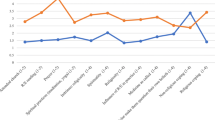Abstract
Clinicians' knowledge of and sensitivity to religious issues have been questioned. The present study measures religious knowledge and willingness to utilize such knowledge in clinical practice. We administered a 41-item questionnaire testing religious knowledge and willingness to utilize such knowledge to 28 psychiatric clinicians. The mean religious knowledge score was 61% of the total possible score. In spite of low scores, only 33% of clinicians consistently refrained from initiating discussions of religious issues. Results support a low level of religious knowledge but do not support a contention that clinicians are insensitive to religious issues.
Similar content being viewed by others
References
Post, G.P., Letter. American Journal of Psychiatry, 1990; 147: p. 813.
Sevensky, R.L., “Religion, Psychology, and Mental Health.” American Journal of Psychotherapy, 1984; 38: pp. 73–86.
Galanter, M., Larson, D., and Rubenstone, E., “Christian Psychiatry: The Impact of Evangelical Belief on Clinical Practice. American Journal of Psychiatry, 1991; 148: pp. 90–95.
Bergin, A.E., “Psychotherapy and Religious Values.” J Consult Clin Psychol 1980; 48: pp. 95–105.
Larson, D.B., Sherrill, K.A., Lyons, J.S., Craigie, F.C. Jr., Thielman, S.B., Greenwold, M.A., and Larson, S.S., “Associations between Dimensions of Religious Commitment and Mental Health Reported in the American Journal of Psychiatry and Archives of General Psychiatry: 1978–1989.” American Journal of Psychiatry, 1992; 149: pp. 557–559.
Sheehan, W., and Kroll, J., “Psychiatric Patients' Belief in General Health Factors and Sin as Causes of Illness.” American Journal of Psychiatry, 1990; 147: pp. 112–113.
Post, S.G., “DSM-III-R and Religion.” Social Science and Medicine, 1992, 35: pp. 81–90.
Kroll, J., and Sheehan, W., “Religious Beliefs and Practices among 52 Psychiatric Inpatients in Minnesota.” American Journal of Psychiatry, 1989, 146: pp. 67–72.
Larson, D.B., Pattison, E.M., Blazer, D.G., Omran, A.R., and Kaplan, B.H., “Systematic Analysis of Research on Religious Variables in Four Major Psychiatric Journals, 1978–1982.” American Journal of Psychiatry, 1986; 143: pp. 329–334.
Sims, A.C., “Symptoms and Beliefs.” J R Soc Health, 1992; 112: pp. 42–46.
Favazza, A.R., “Modern Christian Healing of Mental Illness.” American Journal of Psychiatry, 1982; 139: pp. 728–735.
Spero, M.H., “The Reality and the Image of God in Psychotherapy.” American Journal of Psychotherapy, 1985; 39: pp. 75–85.
Saucer, P.R., “Evangelical Renewal Therapy: A Proposal for Integration of Religious Values into Psychotherapy. Psychol Rep 1991; 69: pp. 1099–1106.
Bergin, A.E., “Values and Religious Issues in Psychotherapy and Mental Health.” American Psychology, 1991; 46: pp. 394–403.
Rights and permissions
About this article
Cite this article
Meitzen, M.O., Seime, R.J. & Ward, H.E. Religious Knowledge and Its Use in Psychiatry. Journal of Religion and Health 37, 5–8 (1998). https://doi.org/10.1023/A:1022900814929
Issue Date:
DOI: https://doi.org/10.1023/A:1022900814929




